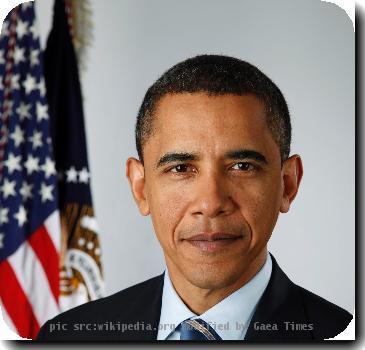Obama’s Iran outreach: Offering dialogue but also seeking sanctions
By Brian Murphy, APMonday, March 22, 2010
Obama to Iran: Seeking talks but eye on sanctions
DUBAI, United Arab Emirates — President Barack Obama’s attempts to reach out to Iran are hitting a closed door in Tehran, but they could be helping him in building an international consensus for more sanctions and pressure on Iran’s ruling clerics.
Obama’s latest approach to Iran over the weekend went very much according to expectations: Washington offered another chance for dialogue and it was quickly batted away by Iran’s supreme leader.
“I don’t think Obama is under any impression that (Supreme Leader Ayatollah Ali) Khamenei is going to rush to the table,” said Meir Javedanfar, an Iranian-born regional analyst based in Israel. “He is doing it for his own position.”
The goal, experts say, is to reinforce the view that Iran’s leadership is unwilling to make bold moves with the West. At the same time, Washington needs to win over China and Russia — both U.N. Security Council members and Iranian allies that have balked at supporting harsher sanctions.
On Friday — just as Obama released his video message to mark the Iranian New Year — there was a flash of Russian impatience on Iran’s foot dragging.
Russian Foreign Minister Sergey Lavrov said Iran was allowing an opportunity for mutually beneficial dialogue with the West to “slip away.”
He was joined in Moscow by Secretary of State Hillary Rodham Clinton, who added that Washington was “pulling together the world” on placing more sanctions on Iran.
Obama, who came to office promising a policy of dialogue with Iran, has shifted his tone in his outreach over the past year. His New Year’s message was targeted more to the Iranian people, offering greater cultural exchanges, than to Tehran’s leadership, which he criticized for isolating Iran.
On Monday, Clinton was even sharper, parts of Iran’s government have become “a menace” to the Iranian people and the region. She told a pro-Israel group, the American Israel Public Affairs Committee, that Washington will never allow a nuclear-armed Iran and that Obama seeks new sanctions “that will bite.”
The attempt to go over the heads of the Iranian leadership to appeal to the public evolved as the Tehran government has pushed ahead with its crackdown on political dissent following disputed presidential elections last June.
At the same time, Iran rebuffed U.N.-backed proposals to exchange its low-enriched uranium for reactor-ready nuclear fuel created abroad. The goal of the offer was to reduce Iran’s stockpile of material that could eventually be turned into weapons-grade material.
The U.S. and its allies worry that Iran is using its nuclear program to also develop atomic weapons. Iran says it only seeks energy-producing reactors.
Leaving the door open for U.S.-Iran talks lets the Obama administration show countries reluctant on sanctions that it is at least trying talk — while hawks in Israel and elsewhere openly discuss military strategies against Iran’s nuclear program.
“Frankly, it’s a result of a poverty of options more than anything else,” said Mehrzad Boroujerdi, a professor of Middle Eastern politics and trends at Syracuse University. “You take away the option for talks and there is very little left that’s not just pure confrontation.”
But it requires a deft touch by Washington.
Obama is technically offering dialogue to the leadership accused of stealing the presidential election and widely disgraced in international eyes for the relentless arrests that followed. Yet Obama is also trying show Iranian opposition groups that is has not abandoned them.
“Obama’s outreach is infuriating the Iranian leadership,” said Javedanfar. “They are at a loss. The last thing they want is to have the world’s most powerful politician to reach out to the people of Iran and undo years of Iranian efforts to portray the U.S. as the ‘Great Satan.’”
A former State Department No. 3 official, Nicholas Burns, described Obama’s strategy with Iran’s nuclear program as a “marathon, not a sprint.”
The offer for talks, he said, can work in tandem with the harder lines: pushing for sanctions and bolstering U.S. military cooperation with its Arab allies, which fear Iran’s growing ambitions and influence in the Gulf and beyond under President Mahmoud Ahmadinejad.
“We need to keep the door open to possible negotiations,” said Burns, a professor of diplomacy and international politics at Harvard’s Kennedy School of Government. “That strengthens Obama’s international credibility and it keeps Ahmadinejad off balance.”
The U.N. Security Council could consider new punishments on Iran, including increasing financial squeezes on the extensive holdings of Iran’s Revolutionary Guard. U.S. lawmakers also could seek to penalizing companies that sell fuel to the oil-rich Islamic republic, which imports about 40 percent of its fuel needs because its refineries cannot keep pace.
Iran’s Supreme Leader Khamenei did not outright reject the offer in Obama’s new year’s message. But it was hard to find any conciliatory tones. The crowd listening to Khamenei several times broke into chants of “death to America” and “death to Obama.”
“You cannot speak about peace and friendship while plotting to hit Iran,” Khamenei said.
He lashed at Obama for what Iran calls support of opposition protesters.
“You talk of human rights and democracy … then you take the side of a bunch of rioters and call this a civil rights movement,” Khamenei said in reference to Obama. “Aren’t you ashamed of yourself?”
Obama, however, has little choice but to keep open the prospect for dialogue, said Ehsan Ahrari, an analyst on Middle Eastern affairs based in Honolulu.
“Iran is not about to give up its nuclear research program,” he said. “Keeping open the option of dialogue seems still viable.”
Associated Press Writer Daniel Estrin in Jerusalem contributed to this report.
Tags: Barack Obama, Dubai, Eastern Europe, Europe, Foreign Policy, Iran, Israel, Middle East, North America, Russia, Tehran, United Arab Emirates, United States

